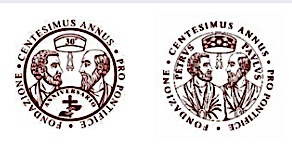Pope Francis’ address to participants in the “Dialogues for Fully Sustainable Finance”,
promoted by the Centesimus Annus Pro Pontifice Foundation (CAPP Foundation)
Dear friends,
I greet the President, the members of the Centesimus Annus Foundation and all those who are taking part in the “Dialogues” that it has promoted in collaboration with ProsperaProgetto Speranza
(Prospera Progetto Speranza)
I have read with interest the results of the work you have done over the last two years to initiate a dialogue between finance, humanism and religion: it is not easy.
You have chosen to begin these “dialogues” with representatives of the Italian financial system.
An economist once told me: dialogue between economics and philosophy, religion and humanism is possible.
Dialogue between finance, theology and humanism, on the other hand, is very difficult.
That is curious! An Italian financial system, which has an ancient history behind it, in which, for example, the “Monti di Pietà” were a great spur to help the poorest without falling into the logic of welfare, and favored loans to allow people to be able to work and, through their activity, regain their rightful dignity. ~(Editor’s note: “Monti di Pietà” was a pawnshop Institution intended to grant loans (even minimal ones) at mild conditions, with a pledge of movable property. The ‘monti do pieta’ arose in the various Italian states around the middle of the 15th century, thanks to the work of the Franciscans, with the aim of freeing the less wealthy classes from usury)
In fact, “helping the poor with money must always be a temporary remedy to cope with emergencies. The real objective should be to enable them to live a dignified life through work” (Encyclical Letter, n. Laudato Si’, 128)
I have also been struck by the primary objective you have set for yourselves: to reflect, together with the leaders of the financial world, on the possibility that the commitment to do well and the commitment to do good can go hand in hand.
In other words, you have set yourself a noble task: to combine effectiveness and efficiency with integral sustainability, inclusion and ethics.
You rightly say that you are convinced that the social teaching of the Church can be a compass.
Bit for this to really happen, it is necessary not to stop at exhortation, but to be able to look at the functioning of finance, to denounce its weaknesses and to imagine concrete correctives.
Let me give you an example.
In the so-called Siglo de Oro (The Golden age)– the sixteenth century –the wool trade in Spain was a flourishing market that moved great economic capitals.
The Spanish theologians of the time began to write treatises on this type of trade, giving ethical assessments that changed with the changing historical context.
In fact, the war in Flanders meant that those who worked directly in breeding and shearing no longer received adequate payment for their work, and so they denounced that financial system, showing its weaknesses and demanding greater fairness.
The Spanish theologians were able to intervene because they knew that process of work, and therefore they did not limit themselves to saying: “we must seek the common good“, but they explained what was wrong and asked for precise actions of change for the common good.
You know the financial processes, and this is your great strength, but it is also a great responsibility.
It is up to you to work out how to diminish iniquity: I repeat, let rreduce fraud!.
Because “a financial reform that does not ignore ethics would require a vigorous change of attitude on the part of political leaders […]. Money must serve, not govern!” (Exhortation Ap. Evangelii Gaudium, 58).
I once heard a political critic say, “This country is governed by pockets.”
You have worked on three levels: thought, concreteness and the appreciation of the good.
I agree that it is necessary never to lose sight of concreteness, because what is at stake is the fate of the poorest, of people who struggle to find the means to live a dignified life.
The work you have done in Milan is encouraging, and perhaps it would be a good thing to extend it to other financial centers, promoting a model of dialogue that spreads and generates a paradigm shift.
In fact, the technocratic paradigm remains dominant; there is a need for a new culture, capable of making room for a sufficiently solid ethic, culture and spirituality (cf. Laudato Si’, 105).
I thank you for the work you have done and are doing.
Thanks to Centesimus Annus for its initiative!
I encourage you to continue and spread this method and this style.
Dialogue is always the best way, also to improve our common home.
I bless you and ask you to please pray for me. Thank you.


